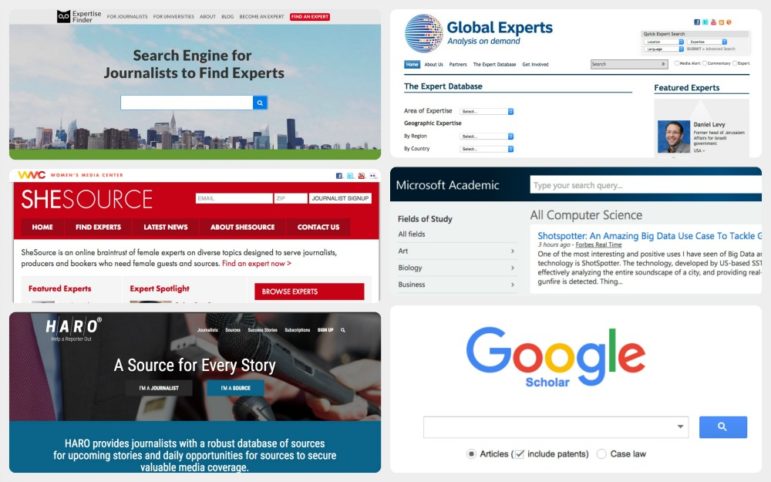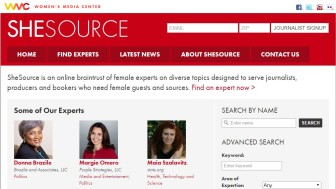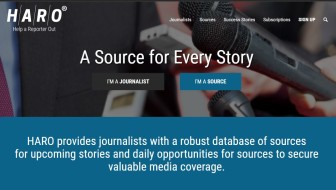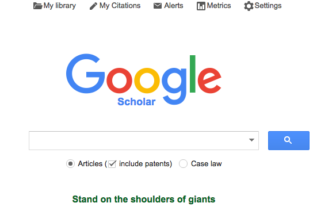 Looking for sources? Finding experts in a particular field is a good place to start for many stories. GIJN took a look at various guides to expert sources. After cutting those that are outdated, too specialized, or tools of the PR industry, we found a handful worth consulting. Here are six services with functioning, reliable databases used by journalists searching for expert sources.
Looking for sources? Finding experts in a particular field is a good place to start for many stories. GIJN took a look at various guides to expert sources. After cutting those that are outdated, too specialized, or tools of the PR industry, we found a handful worth consulting. Here are six services with functioning, reliable databases used by journalists searching for expert sources.
Also visit the section on female experts in GIJN’s Women in Journalism Resource Center.
SciLine, sponsored by the American Academy for the Advance of Science, is “an independent, freely available service providing timely access to trustworthy, articulate experts for journalists and other communicators producing print, broadcast, or digital stories about science-related issues.” You submit an online request, stating your deadline and the expertise you need.
The Request a Woman Scientist platform sponsored by 500 Women Scientists “connects our extensive multidisciplinary network of vetted women in science with anyone who needs to consult a scientist for a news story, invite a keynote speaker or panelist for a conference or workshop, find a woman scientist to collaborate on a project, or serve as a subject matter expert in any capacity.”
Diverse Sources is a searchable database of underrepresented experts in the areas of science, health and the environment.
 Expertise Finder, created by a former journalist and a software engineer, allows reporters to find experts by area of expertise. The search engine generates a list of vetted sources from accredited U.S. and Canadian universities and reputable think tanks. Source pages provide a list of expertise areas, professional bios, and contact information. The service is free and the company reportedly generates revenue by building custom expert directories for universities and colleges.
Expertise Finder, created by a former journalist and a software engineer, allows reporters to find experts by area of expertise. The search engine generates a list of vetted sources from accredited U.S. and Canadian universities and reputable think tanks. Source pages provide a list of expertise areas, professional bios, and contact information. The service is free and the company reportedly generates revenue by building custom expert directories for universities and colleges.
 SheSource, a project of the non-profit Women’s Media Center, is a database of 1,100 vetted female experts on diverse topics around the world, searchable by name, keyword and area of expertise. Source bios and photos are provided and experts can be contacted through a form on the website.
SheSource, a project of the non-profit Women’s Media Center, is a database of 1,100 vetted female experts on diverse topics around the world, searchable by name, keyword and area of expertise. Source bios and photos are provided and experts can be contacted through a form on the website.
Women Plus is a list of more than 750 self-nominated “tech experts” arranged by categories.
Expertfile features experts on over 25,000 topics. ExpertFile has distribution partnerships with the Associated Press.
The China-Africa Project has a resource listing professionals engaged in all aspects of China-Africa relations.
ProfNet is run by PR Newswire and is free for journalists who sign up.
Finding Experts Using the Internet 2018 is a huge collection of potential sources compiled by Marcus P. Zillman for LLRX (Law and Technology Resources for Legal Professionals). LLRX.com was established in 1996 by Founder, Editor and Publisher Sabrina I. Pacifici.
The Conversation Research and Expert Database, lists authors who have appeared in The Conversation, an “independent source of news and views, from the academic and research community, delivered direct to the public.”
 Help a Reporter Out (HARO) is owned by Cision, a Chicago-based media intelligence company, and is a free subscription service that allows professional reporters from non-subscription based outlets to submit a query explaining their story synopsis, requirements, and deadline. The query is reviewed by HARO editors and sent via email to registered sources and/or their media reps. Interested sources then pitch the querying journalist, who can choose to remain anonymous. According to the company, 55,000 journalists and 800,000 sources are registered with the service. contact emails are provided.
Help a Reporter Out (HARO) is owned by Cision, a Chicago-based media intelligence company, and is a free subscription service that allows professional reporters from non-subscription based outlets to submit a query explaining their story synopsis, requirements, and deadline. The query is reviewed by HARO editors and sent via email to registered sources and/or their media reps. Interested sources then pitch the querying journalist, who can choose to remain anonymous. According to the company, 55,000 journalists and 800,000 sources are registered with the service. contact emails are provided.
 Google Scholar and Microsoft Academic are databases that provide researchers with a comprehensive list of published academic work and its authors by subject search. Results can be prioritized by date and amount of citations to help identify the most relevant academic experts. Some expert pages include bios, publications, affiliations, areas of study, co-authors and links to author websites, as available. Some work is accessible through links or PDF attachments. Google Scholar also has an email alert function, which can notify journalists of new academic publications in their subject area.
Google Scholar and Microsoft Academic are databases that provide researchers with a comprehensive list of published academic work and its authors by subject search. Results can be prioritized by date and amount of citations to help identify the most relevant academic experts. Some expert pages include bios, publications, affiliations, areas of study, co-authors and links to author websites, as available. Some work is accessible through links or PDF attachments. Google Scholar also has an email alert function, which can notify journalists of new academic publications in their subject area.
Shoeleather, a US database started in 2018 to identify writers from non-media hub cities (NYC, L.A., D.C., SF) who are local, knowledgeable and ready to tell their community stories.
A nice treatment of how to find and nurture sources, and protect them, is Chapter Six in The Investigative Journalism Manual, a 2010 project of the Global Media Programmes of the Konrad Adenauer Stiftung (KAS).
Have another service to add? Write us at GIJN.
Last updated in April 2021.

Expertise Finder “reportedly generates revenue by building custom expert directories for universities and colleges”.
I’m the co-founder of expertisefinder.com. We indeed make money by selling our software to power experts directories for universities and colleges (here is a client’s directory as an example http://experts.ryerson.ca/).
PS there is no way to pay to rank higher or to be listed as an expert. I came up with it while a frustrated TV producer.